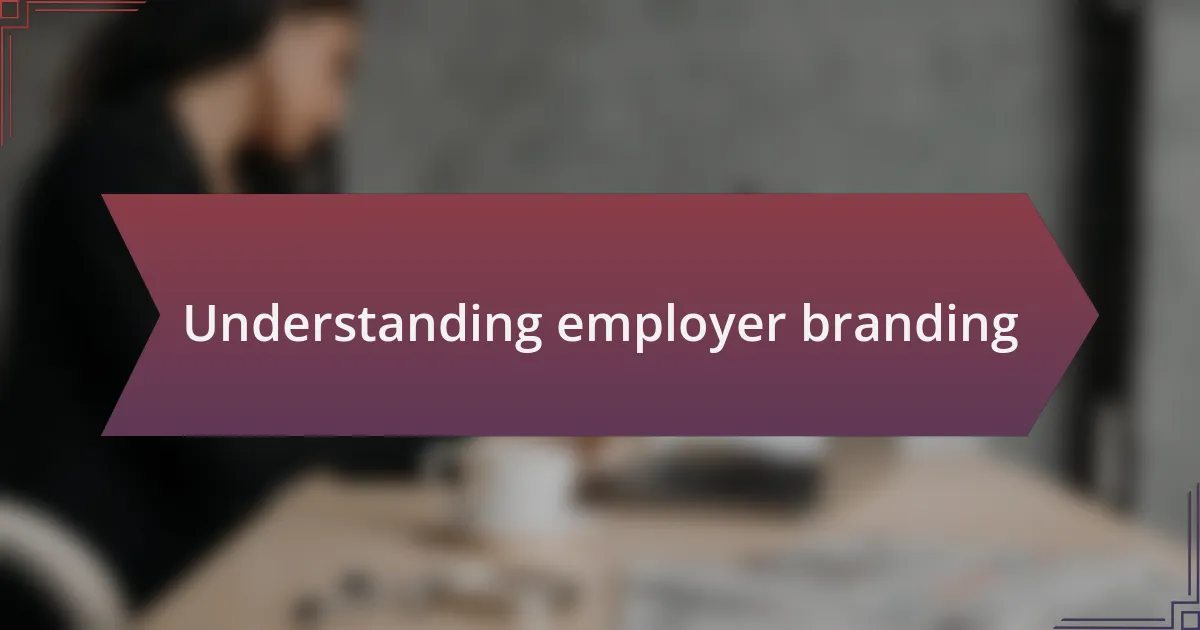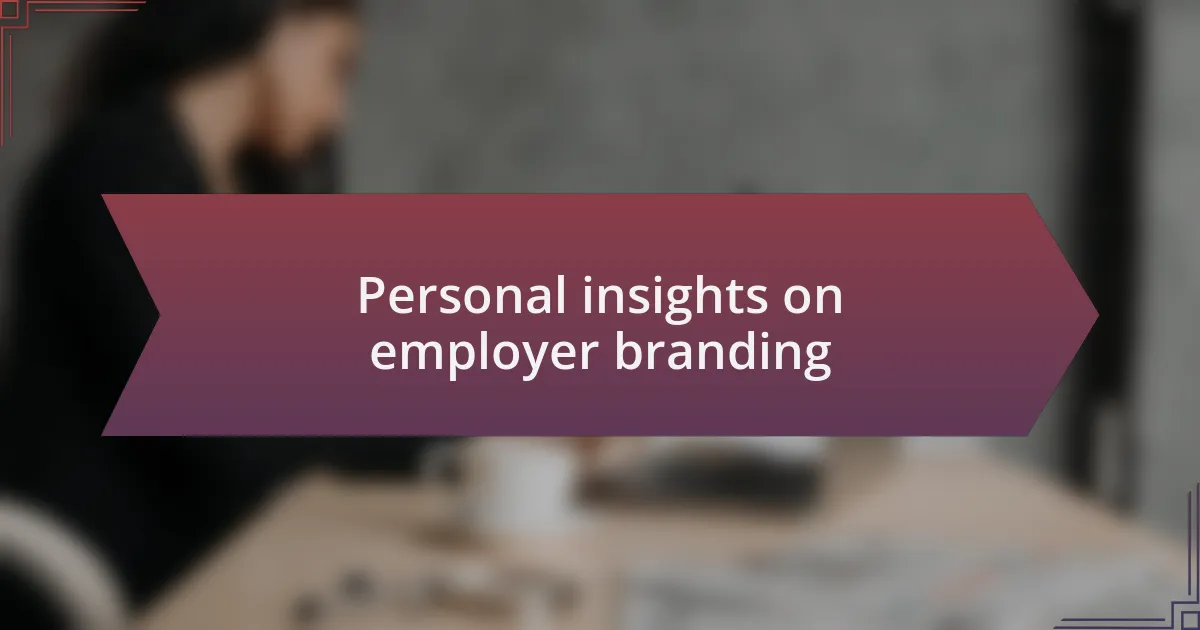Key takeaways:
- Employer branding encompasses the entire employee experience, influencing both workplace culture and recruitment efforts.
- Strong employer brands are built on clear values, genuine employee experiences, and authentic actions that align with messaging.
- Legal compliance and aligning branding with equitable hiring practices are crucial to avoid misrepresentation and attract diverse talent.
- Consistency in messaging and employee engagement in the branding process significantly enhance branding effectiveness and perception.

Understanding employer branding
Employer branding is much more than just a catchy slogan or a well-designed logo; it’s about the entire experience an employee has with a company. I remember feeling welcomed on my first day at a previous job, where the values they communicated during the hiring process were reflected in every interaction I had. This alignment made me feel valued and motivated, which is exactly what effective employer branding aims to achieve.
At its core, understanding employer branding means recognizing that employees are ambassadors of your company’s reputation. Have you ever thought about how a simple conversation at a social gathering can transform someone’s perception of a workplace? I’ve witnessed friends rave about their employers because of supportive cultures and clear communication. This word-of-mouth can significantly influence a company’s ability to attract top talent.
Moreover, employer branding is a dynamic process that evolves with the changes in workplace culture and employee expectations. I’ve seen companies adapt their branding to reflect a more inclusive and diverse environment, which not only resonates with employees but also enhances recruitment efforts. Understanding this fluidity is crucial for any organization striving to maintain a compelling presence in today’s competitive job market.

Importance of employer branding
It’s fascinating how employer branding can fundamentally shift a company’s culture. I remember joining a startup that emphasized transparency and innovation in its branding. The way they communicated their commitment to openness created a sense of trust almost immediately. It made me think, how could other companies harness the same power of authenticity to foster engagement among their teams?
When organizations invest in employer branding, they’re not just promoting themselves; they’re improving employee satisfaction and retention. I’ve talked to colleagues from various industries, and many have shared how a strong brand identity made them feel proud to contribute to something larger than themselves. Isn’t it true that a thriving work environment often stems from a well-articulated brand that aligns with employees’ values?
Furthermore, a well-defined employer brand enhances recruitment efforts by attracting candidates who are genuinely aligned with the company’s mission. I once went through a hiring process where the values presented in the interviews resonated deeply with me, making me eager to join the team. Have you noticed how candidates often seek roles that reflect their own beliefs and aspirations? This alignment not only fills positions quickly but also increases the chances of long-term employee engagement and loyalty.

Key elements of employer branding
Strong employer branding begins with a clear understanding of the company’s values and culture. I recall a time when a friend eagerly shared her experience at a company where the leadership communicated their vision consistently. It made me wonder, how can companies ensure that their values resonate not just in their marketing materials, but throughout every level of the organization?
Another vital element is employee experience. When I worked for a firm that prioritized employee well-being, it transformed the workplace atmosphere. I felt genuinely valued, and I often ask myself whether organizations realize how crucial it is to create an environment where employees feel both supported and empowered. It’s not merely about perks; it’s about fostering a culture that encourages growth.
Finally, the authenticity of the employer brand cannot be overlooked. I once encountered a company that boasted about its inclusive culture yet fell short in practice. This disconnect left me skeptical. I believe it’s essential for organizations to not only make promises but to live up to them. After all, doesn’t true branding stem from genuine actions that speak louder than words?

Legal considerations in employer branding
When it comes to employer branding, one of the first legal considerations that come to mind is compliance with labor laws. I once worked for a company that excitedly launched a new branding campaign, only to realize later that their messaging unintentionally misrepresented the work culture. This oversite opened up potential legal risks concerning misadvertised job roles. Have you ever stopped to think how easily a brand’s image can spiral into a legal dispute over inaccuracies?
Another important factor is ensuring that recruitment practices adhere to anti-discrimination laws. I recall attending an interview where the company’s branding emphasized diversity, yet the hiring practices seemed to favor a specific demographic. This contradiction highlights how crucial it is for companies to align their branding with equitable hiring practices. I often wonder, can an employer genuinely attract a diverse talent pool without living out the values they promote?
Finally, protection of intellectual property can’t be ignored in the realm of employer branding. I remember when a client faced legal challenges because their branding materials contained images without proper licensing. This experience underscored the need for organizations to be diligent about their branding assets. Isn’t it fascinating how a few missteps in legal precautions can overshadow even the strongest branding efforts?

Challenges in employer branding
Crafting a strong employer brand is fraught with challenges, particularly when expectations don’t match reality. I recall a time when I was involved in a company’s rebranding initiative. Despite the excitement surrounding the launch, many existing employees felt the new messaging didn’t reflect their daily experiences. This gap between perception and reality led to trust issues that lingered long after the campaign ended. How often do we overlook the voices of current employees in shaping our brand narrative?
Another hurdle is managing the dynamic between online reputation and employer branding. I vividly remember reading reviews about an organization that touted a supportive work culture while past employees shared stories of a toxic environment. This disconnect often stems from a company’s inability to effectively communicate and uphold its values. Have you ever considered how one negative review can ripple through the entire image of an employer?
Additionally, maintaining consistency across various platforms is a recurring challenge. In my experience, I’ve seen organizations struggle when they try to adapt their core message for different social media channels. This inconsistency can create confusion among potential candidates. It makes me wonder, is it really possible to control every narrative in today’s digital age?

Personal insights on employer branding
When I think about the essence of employer branding, I often reflect on how it significantly influences employee engagement. A past organization I worked for shone in this regard; their commitment to values like integrity and innovation was palpable. I remember the regular town hall meetings where employees could openly share ideas and concerns—it fostered an environment where everyone felt they belonged. Isn’t that the kind of atmosphere we all crave in our workplaces?
Another crucial aspect I’ve observed is the importance of storytelling in employer branding. I once attended a career fair where a company’s booth was filled with personal success stories from employees. Hearing firsthand accounts of growth and achievement made the organization feel more relatable. Why do we still underestimate the power of genuine narratives in connecting with potential hires?
Lastly, I feel that transparency is paramount in building a credible employer brand. At a previous employer, we had an open-door policy, which allowed for honest discussions about workplace challenges. This openness not only helped improve morale but also attracted talent who valued a culture of authenticity. How can we expect to attract the right candidates if we’re not upfront about what it’s really like to work for us?

Strategies for effective employer branding
Creating a strong employer brand requires consistency in messaging across all channels. In my experience, aligning company values with daily practices creates a powerful narrative. When I joined a startup, their commitment to work-life balance wasn’t just a slogan; it was evident in their flexible scheduling options. How refreshing is it when a company truly stands behind its promises?
Another key strategy is engaging employees in the branding process itself. At one company I worked with, we hosted workshops where staff contributed to shaping the employer brand. This involvement made employees feel invested and empowered, as they saw their input reflected in the company’s public image. Have you ever noticed how much stronger a brand feels when it’s a collective effort?
Moreover, leveraging social media effectively can amplify your employer branding efforts. I recall a time when a company I admired actively shared not just job postings but insights into their culture, employee achievements, and community involvement. This approach not only painted a vivid picture of what to expect but also fostered a sense of connection. Isn’t it fascinating how a simple post can create a profound impact on attracting talent?